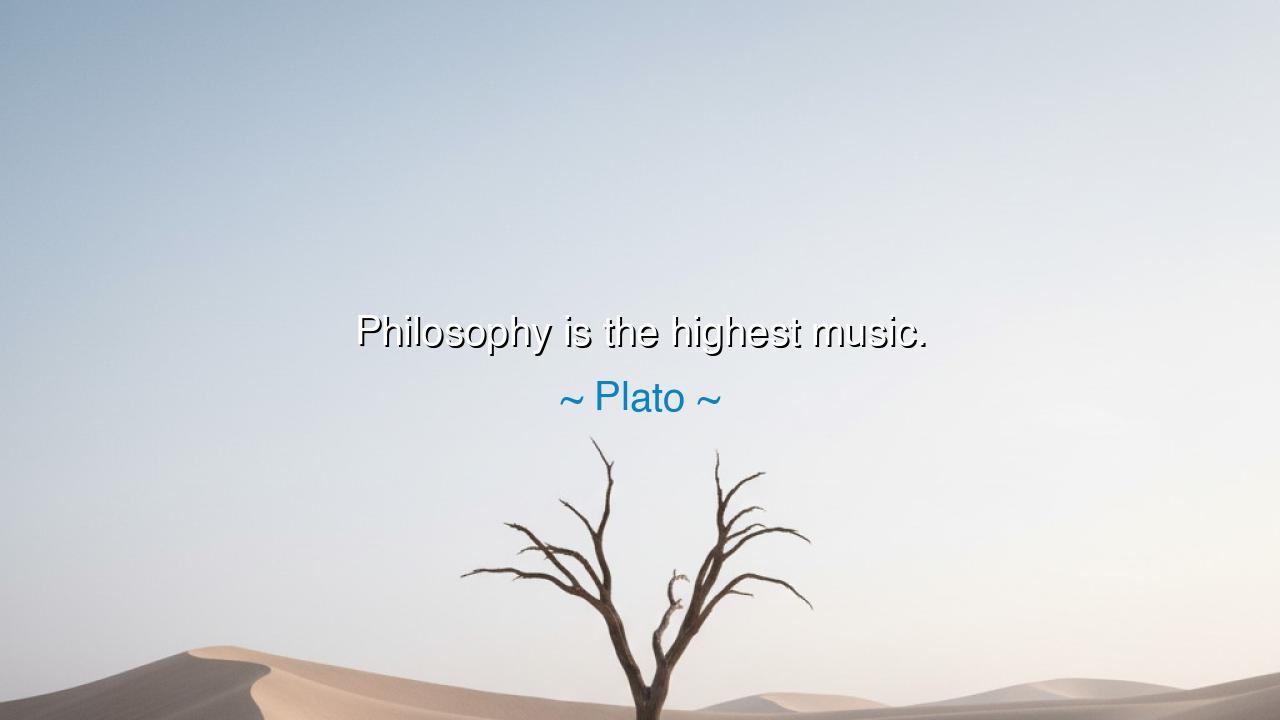
Philosophy is the highest music.






The saying “Philosophy is the highest music”, spoken by the sage Plato, is not a phrase of ornament, but a deep truth clothed in metaphor. In these words, he proclaims that the quest for wisdom is not cold calculation, but a harmony of the soul. Just as music unites notes into melody, so philosophy unites thoughts into truth. Where the lyre stirs the ear, philosophy stirs the spirit; where song delights the senses, wisdom awakens the eternal part of man. To Plato, the true music is not merely heard with the body, but resonates in the soul, drawing it upward toward the divine order.
In the ancient world, music was more than amusement—it was discipline for the spirit. The Greeks believed that the right melody could calm anger, stir courage, or guide men toward virtue. But Plato saw beyond this: he understood that the purest harmony lies not in strings or voices, but in the ordering of thought, the alignment of reason with justice, of the human with the eternal. Philosophy, then, becomes the symphony of the mind, where truth and goodness are the instruments, and the wise man is the conductor.
Consider the example of Socrates, Plato’s master. He played no harp, nor did he delight crowds with song. Yet when he walked the streets of Athens, speaking of virtue, of justice, of the immortality of the soul, he wove a music greater than any chorus. Those who listened felt the stirring of inner strings they had never known were there. Even as he drank the cup of poison, his final words rang like a hymn of truth, a melody that has not ceased to echo through centuries. Here is proof that philosophy sings deeper than music, for its notes are eternal.
Another tale may be told of Marcus Aurelius, emperor of Rome, who bore the burdens of empire. Amid wars and conspiracies, he turned to his meditations, writing words of wisdom in the silence of night. These writings were not laws for soldiers, nor songs for banquets, but harmonies of thought that still guide the weary and the lost. His philosophy was the music of endurance, courage, and serenity—a melody that comforted even those he never knew.
What lesson, then, must we draw? That the pursuit of philosophy—of truth, of wisdom, of virtue—is not a dry task, but a melody that shapes the soul into beauty. Just as a musician practices daily to keep his art pure, so must we practice reflection, questioning, and the seeking of truth. To ignore philosophy is to live out of tune, to let one’s life become a noise instead of a song. But to embrace it is to join the great chorus of the wise, whose music resounds through eternity.
And so, children of tomorrow, when you labor, when you suffer, when you rejoice, remember that your life itself is an instrument. Every action, every thought, is a note. Ask yourself: does this note contribute to harmony or to discord? Shape your deeds so that they ring true with justice, kindness, and courage. In this way, you become both the musician and the music, the seeker and the song.
Therefore, take Plato’s words as a guide: “Philosophy is the highest music.” Let your mind be the lyre, your reason the strings, your soul the breath that gives them sound. Tune yourself daily through study, reflection, and the practice of virtue. Seek not only to live, but to live beautifully, as part of the grand harmony that binds heaven and earth.
For in the end, when the voices of time are silenced, when the instruments of men have long decayed, the music of wisdom shall remain. It will not perish, for it belongs not to the fleeting world, but to the eternal. And those who have lived in tune with truth will not fade, but will be remembered as part of the highest symphony—the eternal music of philosophy.






AAdministratorAdministrator
Welcome, honored guests. Please leave a comment, we will respond soon